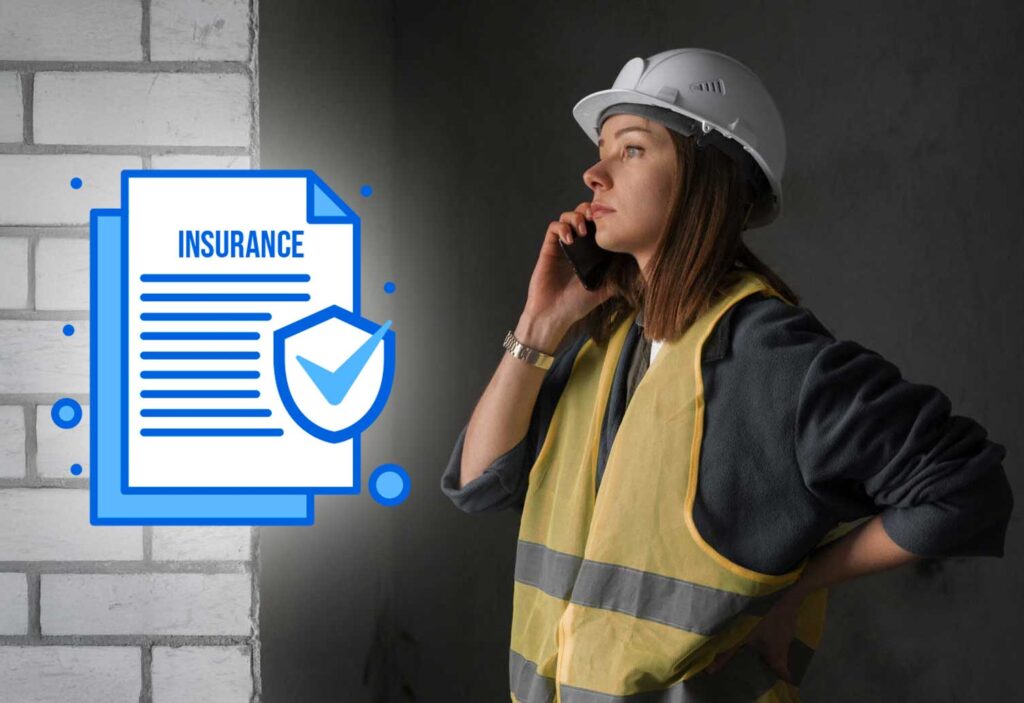Types of Construction Insurance (Explained for Contractors)

Table of Contents
- What is Construction Insurance?
- Construction Insurance Requirements for Contractors
- What Insurance Does a Construction Company Need
- Types of Construction Insurance
- What Construction Insurance Doesn’t Cover
- How Much Is Construction Insurance?
- Pro Tips for Finding the Best Insurance
- Final Thoughts
- Construction Insurance FAQs
This guide covers contractors insurance requirements working on construction projects, as well as how to get your construction insurance and why contractors need insurance, the types of insurance in the construction industry, what they cover (and don’t cover), how much they cost, and how to find the best policy for your business.
If you’re in the construction industry, you already know how uncertain things can get. One day, everything’s on track; the next, a piece of equipment breaks, an accident happens, or the weather disrupts your schedule.
That’s where construction insurance comes in. It protects your business from these risks and, in many cases, is required by law or your clients.
Let’s break it down.
What is Construction Insurance?
Picture this: You’re midway through a commercial project when a storm damages part of the structure. Without insurance, you’d be stuck paying for repairs out of pocket, potentially derailing your entire timeline and budget. Construction insurance is there to protect you from these kinds of financial risks.
Here’s why it’s crucial:
- It’s Legally Required: Many states mandate specific policies like workers’ compensation or liability insurance.
- It Builds Trust: Clients are more likely to hire you if you’re insured because it shows you’re prepared for the unexpected.
- It Keeps Projects Moving: Insurance ensures that setbacks like stolen tools or medical bills don’t stall your work.
Take Jake, for example. A contractor in Texas, Jake’s uninsured business suffered a major blow when a fire destroyed his job site materials.
With no insurance to fall back on, he had to dip into his savings, delaying the project and damaging his reputation. Stories like Jake’s highlight why insurance isn’t just an option—it’s essential.
RELATED ARTICLE: How To Start A Construction Company? Step-by-step Guide

Construction Insurance Requirements for Contractors
Construction insurance requirements vary by state, your role on the construction project, and the size of your construction business. For example:
- Workers’ Compensation Insurance: Required in nearly all states if you have employees.
- General Liability Insurance: Often mandatory for larger projects or government contracts.
Let’s say you’re a roofing contractor in Florida. Liability insurance is crucial for covering property damage claims if a job doesn’t go as planned.
If you have employees, workers’ comp is non-negotiable to cover medical expenses for on-the-job injuries. Even if you’re a solo contractor, having insurance can give clients peace of mind and help you win more jobs.
In addition, most states require proof of insurance to obtain a General Construction License.
What Insurance Does a Construction Company Need
A construction company needs a variety of insurance types, including general liability, workers’ compensation, and commercial auto.
Other essential coverages are builder’s risk insurance for projects in progress, professional liability (also called errors and omissions) for design or professional errors, and inland marine insurance for mobile equipment. Many businesses also require surety bonds, which aren’t a type of insurance but are crucial for securing contracts, and umbrella liability for extra coverage.
What does contractors insurance cover
- General Liability Insurance: Protects against third-party claims of bodily injury and property damage that occur due to your company’s operations.
- Workers’ Compensation Insurance: Covers medical expenses and lost wages for employees who are injured on the job. This is often a legal requirement by state.
- Commercial Auto Insurance: Covers vehicles used for business purposes, providing liability and physical damage protection for company vehicles.
- Builder’s Risk Insurance: Also known as “Course of Construction” insurance, it covers damage to a building or structure while it is under construction.
- Professional Liability Insurance: Also called errors and omissions (E&O) insurance, it protects against claims of negligence, errors, or omissions in professional services, such as design or engineering mistakes.
Other construction insurance policies
- Surety Bonds: While not insurance, they are often required by clients or municipalities to guarantee project completion or that subcontractors will be paid.
- Inland Marine Insurance: Covers tools and equipment that are transported to and from job sites.
- Contractor’s Equipment Insurance: Protects owned or rented equipment from damage or theft.
- Pollution Liability Insurance: Covers liability from pollution incidents that may occur at a job site.
- Umbrella Liability Insurance: Provides an extra layer of liability coverage above the limits of your other policies, such as general liability and auto liability.

Types of Construction Insurance
Different policies cover different risks. The right combination depends on your business activities, risks, and stakeholders. To help you figure out what you might need, here’s a quick look at the most common types of construction insurance coverage and how they work:
1. General Liability Insurance:
General liability insurance is the foundation of any construction business’s coverage. It protects against third-party claims for bodily injury or property damage.
For example: During a commercial renovation in Chicago, a passerby tripped over a piece of equipment left near the site’s entrance and suffered a sprained ankle. The construction company’s general liability insurance covered the medical bills and legal fees when the individual decided to sue.
2. Workers’ Compensation Insurance
Often referred to as Worker’ comp, it’s a must-have if you have employees. It covers medical expenses, lost wages, and even legal costs if an employee gets injured on the job.
For instance, Luis, a worker at a California construction firm, fell from scaffolding and broke his leg while installing roofing tiles. His employer’s workers’ comp policy not only covered his hospital bills but also compensated him for lost wages during his recovery.
3. Course of Construction Insurance
Also called Builder’s risk insurance, this policy is designed to protect buildings and materials during construction. It covers damage caused by events like fire, theft, or extreme weather.
A construction company in Florida was halfway through framing a residential home when a hurricane blew through, damaging much of the structure. Thanks to their builder’s risk policy, they were able to cover the cost of repairs and avoid major project delays.
4. Professional Liability Insurance
Also known as errors and omissions insurance, this covers claims related to mistakes in professional services.
An architect’s flawed design for a commercial office building in New York City caused significant delays and additional construction costs. The firm’s professional liability insurance covered the legal fees and damages, preventing further financial strain.
5. Commercial Auto Insurance
If you use vehicles for work, like a van for hauling materials or a truck for deliveries, then commercial auto insurance is essential. It covers accidents, theft, and other incidents involving your business vehicles.
A contractor in Texas was transporting materials to a job site when their van was involved in a collision. The commercial auto policy covered the vehicle repairs, medical bills for the other driver, and even the cost of replacing damaged materials.
6. Inland Marine Insurance
This policy protects tools and equipment while they’re in transit or stored off-site.
For instance, a construction company in Georgia had a generator stolen from a job site overnight. Their inland marine insurance covered the cost of replacing the equipment, ensuring the project stayed on schedule.
7. Pollution Liability Insurance
If your work involves hazardous materials, like asbestos, mold, or polluted soil. It covers cleanup costs and legal claims related to environmental damage.
A contractor in Ohio was hired to remove mold from a commercial property. During the job, mold spores accidentally spread to adjoining properties, resulting in costly cleanup efforts and legal claims. The contractor’s pollution liability insurance covered the expenses, saving the business from a financial crisis.
RELATED ARTICLE: How To Estimate Construction Jobs? Step-by-Step Guide
What Construction Insurance Doesn’t Cover
While construction insurance gives you broad protection, it’s not a catch-all.
Knowing what your policy covers, and what it doesn’t, helps you spot potential gaps and decide if you need extra coverage to keep your business fully protected.
This can save you a lot of headaches (and money) down the line. Here are a few things most policies won’t cover:
- Intentional damage caused by you or your team.
- Normal wear and tear on tools and equipment.
- Flood or earthquake damage unless explicitly added.
- Poor workmanship, which refers to issues caused by subpar work.
Take this example: A contractor in Colorado built a residential deck, but the job wasn’t up to standard. A few months later, structural issues popped up, and the homeowner filed a claim.
The contractor’s general liability insurance didn’t cover it because the damage was due to poor workmanship. The contractor ended up having to pay the bill to rebuild the deck, which ate into their profits.
RELATED ARTICLE: How Much Do Construction Workers Make? 2025 U.S. Salary Guide
How Much Is Construction Insurance?
The cost of construction insurance depends on factors like your business size, project scope, and claims history.
Average Annual Premiums:
- General Liability: $500–$1,500.
- Workers’ Compensation: $5,000–$8,000 per employee.
- Builder’s Risk: 1–5% of the project cost.
- Commercial Auto: $800–$5,000 per vehicle.
For example, Sarah, a small contractor with two employees and one work truck, spends about $10,000 annually on general liability, workers’ comp, and auto insurance. However, a larger firm with more vehicles and employees could easily spend five times that amount.
To simplify your project estimates, including insurance costs, try our Estimate Generator.

Pro Tips for Finding the Best Insurance
Getting the right coverage doesn’t have to be complicated. Here are some tips:
- Assess Your Risks: Consider your project types and the risks you face. If you work on high-value properties, you might need higher liability limits.
- Compare Quotes: Don’t just go for the cheapest policy. Look at coverage limits, exclusions, and customer reviews from different insurance companies.
- Work with a Specialist: An insurance broker experienced in construction can help you tailor your policy.
- Bundle Policies: Many providers offer discounts if you combine multiple policies, like liability and inland marine insurance.
- Stay Organized: Use Invoice Fly to store digital copies of your policies and simplify your operations.
Final Thoughts
Construction insurance isn’t just a box to check—it’s your safety net. Whether it’s accidents on-site, stolen tools, or property damage claims, the risks in construction projects are endless, and the financial hit can be massive without proper coverage.
Insurance helps you bounce back quickly, keeping your projects on track and showing clients and partners that you’re professional, reliable, and ready for anything.
Since no two construction businesses are the same, it’s important to choose policies that match your specific needs. From general liability to specialized options like builder’s risk or pollution liability, the right coverage protects you on all fronts.
Make it a habit to review your coverage regularly, keep track of renewal dates, and adjust your limits as your business grows. In an industry full of surprises, insurance gives you peace of mind and the freedom to focus on what you do best—building a successful future.
Ready to take control of your insurance and project management in 2025?
Download Invoice Fly today!
Construction Insurance FAQs
Most construction businesses need general liability insurance to cover property damage or injuries. You may also need workers’ compensation, builder’s risk, and equipment insurance, depending on your work.
It usually costs between $500 and $5,000 per year, depending on the project size, location, and risks involved.
You can get coverage by buying a contractor insurance policy from an insurance provider. It often includes general liability, workers’ comp (if you have employees), and tools and equipment coverage.
The cheapest option is usually general liability insurance, which covers basic risks like property damage or client injuries.
For a small LLC, insurance often costs around $700 to $3,000 per year, depending on your industry, coverage, and number of employees.
